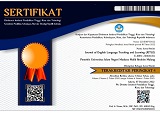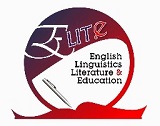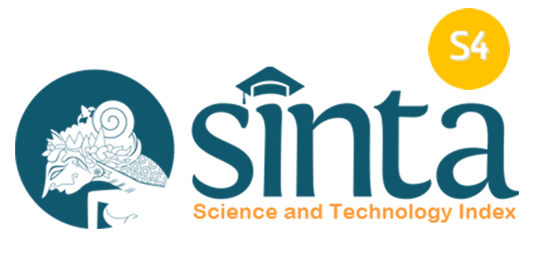The impact of Monkey Stories application on young leaners’ vocabulary acquisition
Abstract
Keywords
Full Text:
PDFReferences
All, A., Nuñez Castellar, E. P., & Van Looy, J. (2015). Towards a conceptual framework for assessing the effectiveness of digital game-based learning. Computers & Education, 88, 29–37. https://doi.org/10.1016/j.compedu.2015.04.012
Chiew Har Leong, A., Jafre Zainol Abidin, M., & Saibon, J. (2019). Learners’ perceptions of the impact of using digital storytelling on vocabulary learning. Teaching English with Technology, 4(19), 3–26. https://bibliotekanauki.pl/articles/569426
Crossland, J. (2016). Optimal learning in schools – theoretical evidence: Part 1 Piaget’s theoretical background. School Science Review, 98(363), 115-122.
Fitria, T. N. (2022). Pengajaran kosakata dasar Bahasa Inggris (English basic vocabulary) dengan metode drilling untuk anak-anak desa Kalangan Mulur Sukoharjo. Lamahu: Jurnal Pengabdian Masyarakat Terintegrasi, 1(2), 67–72. https://doi.org/10.34312/ljpmt.v1i2.15435
Neuman, S, B., & Wright, T, S. (2014). The magic of words: Teaching vocabulary in the early childhood classroom. American Educator, 38 (2), 4-13.
Ningsih, F. (2023). Mapping Vocabulary: A corpus-based comparison of Indonesian fourth-grade students’ writing and English language textbooks. Journal of English Language Teaching and Learning (JETLE), 4(2), Article 2. https://doi.org/10.18860/jetle.v4i2.20683
Nieland, T., Fehrenbach, A., Marowsky, M., & Burfeind, M. (2021). The teacher-centered perspective on Digital Game-Based Learning: Quantitative and qualitative evaluation methods from diverse disciplines. In C. Aprea & D. Ifenthaler (Eds.), Game-based Learning Across the Disciplines (pp. 341–362). Springer International Publishing. https://doi.org/10.1007/978-3-030-75142-5_15
Raptopoulou, A. (2020). Preschool teachers’ perspectives and use of digital game-based learning. Education at Stockholm University.
Raptopoulou, T., & Anastasia, A. (2015). A qualitative study on preschool teachers’ perception on digital game-based learning. Stockholm University, Faculty of Social Sciences, Department of Education.
Reinders, Hayo & Wattana, S.. (2014). Can i say something? The effects of digital game play on willingness to communicate. Language Learning and Technology. 18. 101-123.
Rohmana, W. I. M., & Rinda, R. K. (2019). Humanism Approach in Children Education: A Look Into Humane Perspective Of Teaching English To Children. Preschool (Jurnal Perkembangan Dan Pendidikan Anak Usia Dini), 1(1), Article 1. https://doi.org/10.18860/preschool.v1i1.8171
Rohmana, W. I. M., & Senjana, S. (2022). English Training for PKK Mothers as Strategy to Assist Children Learn English from Young Age. International Journal of Community Service Learning, 6(4), Article 4. https://doi.org/10.23887/ijcsl.v6i4.50358
Sitompul, A. R. (2020). EFL young learners’ vocabulary learning strategies: An overview. 8, 10.
Sudarmaji, I., & Yusuf, D. (2021). The effect of Minecraft video game on students’ English vocabulary mastery. JETAL: Journal of English Teaching & Applied Linguistic, 3(1), 30–38. https://doi.org/10.36655/jetal.v3i1.600
Tsai, Y.-L., & Tsai, C.-C. (2018). Digital game-based second-language vocabulary learning and conditions of research designs: A meta-analysis study. Computers & Education, 125, 345–357. https://doi.org/10.1016/j.compedu.2018.06.020
Ucus, S. (2015). Elementary school teachers’ views on game-based learning as a teaching method. Procedia - Social and Behavioral Sciences, 186, 401–409. https://doi.org/10.1016/j.sbspro.2015.04.216
Umamah, A., & Saukah, A. (2022). Digital Game-Based Learning (DGBL): The voice of EFL university students and teachers. PASAA, 63.
Wu, T.-T. (2018). Improving the effectiveness of English vocabulary review by integrating ARCS with mobile game-based learning. Journal of Computer Assisted Learning, 34(3), 315–323. https://doi.org/10.1111/jcal.12244
DOI: https://doi.org/10.18860/jetle.v5i1.23819
Refbacks
- There are currently no refbacks.
Jalan Gajayana 50 Malang 65144, Jawa Timur, Indonesia

This work is licensed under a Creative Commons Attribution-ShareAlike 4.0 International License.
Indexed by






